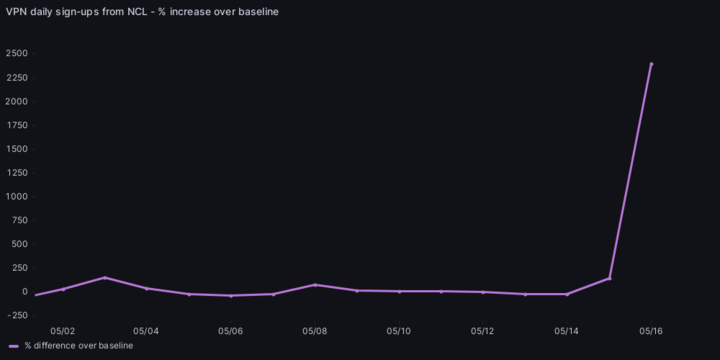French Tiktok ban makes VPN usage soar in New Caledonia
Proton confirms a 2500% spike in VPN sign-ups since May 15

Sign up for breaking news, reviews, opinion, top tech deals, and more.
You are now subscribed
Your newsletter sign-up was successful
Update: On May 17, 2024, Proton confirmed TechRadar that the VPN spike in New Caledonia had gone up to 2500% above normal levels. We updated the article copy and graph accordingly.
People in New Caledonia have reportedly been turning to the best VPN services to keep accessing the TikTok app.
The French government announced the ban on the popular video-sharing app yesterday (May 15, 2024) to quell violent clashes spreading across the South Pacific oversee territory among other measures, after declaring a state of emergency.
The move seems not to have stopped citizens from finding a way to stay connected, though. Speaking to TechRadar, Proton VPN confirmed a 150% increase in VPN sign-ups above baseline, starting shortly after TikTok got shut down. On May 17, the VPN spike had gone up to a staggering 2500% above normal levels.

"People turn to VPNs during turbulent times to ensure they can access the free and fair internet in the face of blocks," a Proton VPN spokesperson told me.
That's because a VPN, short for virtual private network, is security software that spoofs your IP address location to make you appear in a completely different part of the world within seconds. In this instance, people in Caledonia are using Proton VPN and similar services to access their TikTok app from a country where the service is banned.
"We recommend that people across the world sign up to VPNs so that they can get online and communicate even if governments restrict access to certain sites," Proton added.
Why did France ban TikTok?
As we mentioned, France gave an order to block access to TikTok across the island as part of a state of emergency declaration. Other measures also include the deployment of French troops to secure ports and international airports, alongside a national curfew.
This harsh response came as a reaction to three days of violent clashes that left four dead (including a French gendarme) and hundreds wounded. As Politico reported, protests erupted as French lawmakers passed a bill to change the voting system by allowing all citizens residing on the island for more than 10 years to vote in local elections. New Caledonia's indigenous population, the Kanaks, believes this law will ultimately weaken their representation.
While social media blackouts are a widespread measure in times of political crisis, that's usually confined to more authoritarian countries across the world. Proton sees the French decision as a worrisome development.
"This is an unprecedented move in Western democracies to block specific Internet sites—and is a worrying progression that they are flirting with the idea of censoring the Internet as a means of crowd control," Proton VPN's spokesperson told me.
However, it isn't the first time France's President Macron called for a debate on social media blocks to tackle riots in the West. In July last year, while France was coping with days of unrest, EU Commissioner Thierry Breton backed up his ally by declaring that social media shutdowns might be happening in the EU if the platforms fail to quickly delete hateful content during riots under the new Digital Service Act (DSA).
It's worth mentioning, though, that civil society organizations called on the Commissioner to correct his statements. Breton later clarified the DSA should not be used as a justification for arbitrary censorship.
The French government must immediately lift the TikTok ban in New Caledonia!This ban doesn’t “quell riots” as they claim — it simply suppresses dissent, blatantly violating fundamental rights to free expression and access to information. #KeepItOnhttps://t.co/R4w5Z5YdA7May 16, 2024
After all, as digital rights advocacy Access Now pointed out (see tweet above), a TikTok ban doesn't quell riots but rather restricts people's freedoms and fundamental rights.
"Even in times of emergencies, human rights law continues to apply. Such excessive measures can never be considered proportionate. It actively prevents people from adequately accessing information, which is a vital tool during any crisis," Eliška Pírková, Senior Policy Analyst and Global Freedom of Expression Lead at Access Now, told me. "France has an obligation to prevent human rights violations in New Caledonia and it must act accordingly."
Ironically, though, France's TikTok ban across New Caledonia was enforced the same day Access Now released its annual report in which its experts recorded "worsening conditions for internet shutdowns and human rights globally."
Commenting on the findings, Felicia Antonio, #KeepItOn Campaign Manager at Access Now and one of the researchers who wrote the report, told me: "In 2023, governments continued to use communication platform blocks heavily, imposing or maintaining 53 platform blocks across 25 countries, up from 39 blocks across 29 countries in 2022."
How to bypass TikTok ban with a VPN
If you want an in-depth breakdown, check out our guide to downloading the TikTok app and bypassing bans with a VPN, below are the simple steps to take if you are in New Caledonia and anywhere else where TikTok is currently blocked:
- Download your chosen VPN app. I recommend checking our best free VPN guide to find the most reliable freebie out there, and the aforementioned Proton VPN is one of them.
- Connect to a server located in a country where TikTok is available. Keep in mind that India is the biggest democracy also to ban TikTok.
- Start using TikTok as you normally would!
Anthonio from Access Now pointed out that people affected by platform shutdowns can also use the Tor Browser to access blocked sites. She also invites everyone in need to follow the group's digital safety tips where the team provides further guidance and tools for people experiencing shutdowns.
We test and review VPN services in the context of legal recreational uses. For example: 1. Accessing a service from another country (subject to the terms and conditions of that service). 2. Protecting your online security and strengthening your online privacy when abroad. We do not support or condone the illegal or malicious use of VPN services. Consuming pirated content that is paid-for is neither endorsed nor approved by Future Publishing.
Sign up for breaking news, reviews, opinion, top tech deals, and more.

Chiara is a multimedia journalist committed to covering stories to help promote the rights and denounce the abuses of the digital side of life – wherever cybersecurity, markets, and politics tangle up. She believes an open, uncensored, and private internet is a basic human need and wants to use her knowledge of VPNs to help readers take back control. She writes news, interviews, and analysis on data privacy, online censorship, digital rights, tech policies, and security software, with a special focus on VPNs, for TechRadar and TechRadar Pro. Got a story, tip-off, or something tech-interesting to say? Reach out to chiara.castro@futurenet.com